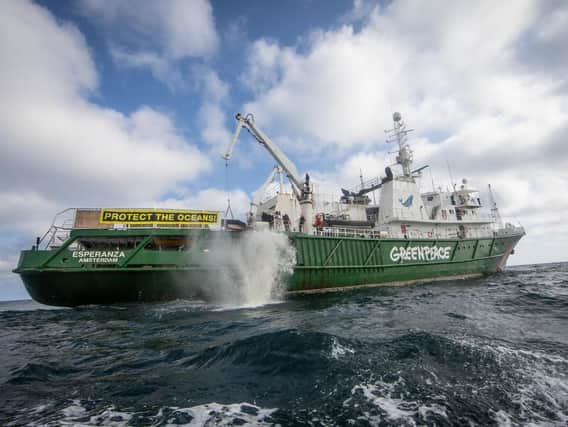Banning harmful trawling on Dogger Bank will help wildlife, experts say


Under new byelaws, harmful bottom trawling would be prohibited in four of England’s offshore marine protected areas, and the use of static fishing gear, such as pots or nets, would be prevented in sensitive parts of two of them.
Campaigners have been calling for greater protection of the UK’s marine protected areas, which are designated for their important habitats such as sandbanks, coral gardens and reefs, and the wildlife they support.
Advertisement
Hide AdAdvertisement
Hide AdConservationists warn that the network of protected areas in the seas consists largely of “paper parks”, where harmful activity such as bottom trawling – in which weighted nets are dragged over the seabed, ploughing it up to catch fish – continues.
Last year, Greenpeace took matters into its own hands to stop bottom trawling in Dogger Bank, which is designated to protect its seabed habitat, by dropping boulders into the marine reserve to create a barrier to fishing gear.
However the York-based National Federation of Fishermen's Organisations said the proposals amounted to a "further sell-out of fishing" coming on the back of the government’s failure to deliver a good Brexit deal for fishermen and damaging delays in the export of fish and shellfish.
The areas where protections could be increased are: Dogger Bank; The Canyons, a deep sea habitat off the coast of Cornwall; and Inner Dowsing, Race Bank and North Ridge Special Area of Conservation, which is off the Lincolnshire and North Norfolk coasts.
Advertisement
Hide AdAdvertisement
Hide AdChris Thorne, an oceans campaigner at Greenpeace UK, said action in the four sites was "just the tip of the iceberg in terms of scale" adding: "Months after we created a 50 square mile bottom trawler exclusion zone in the Dogger Bank by building an underwater boulder barrier, ministers have finally woken up to their responsibilities.
"Yet there are still hundreds of other equally important marine areas still open to all forms of destructive industrial fishing."
However the NFFO said the proposals for Dogger Bank - which is the size of Northern Ireland - would mean fishing boats were displaced "with knock on environmental as well as social and economic impacts."
Assistant NFFO Chief Executive, Dale Rodmell said, “We have worked with managers and government conservation advisors for more than a decade on this site.
Advertisement
Hide AdAdvertisement
Hide Ad"We were given no inkling that this would be the approach on one of the most resilient of habitats covered by the Blue Belt.
"Not even light-weight seine nets are to be permitted – previously it had been proposed this gear type would have full access. This changes the whole calculus on where it was expected that the balance would lie for sustainable fisheries access in meeting site conservation objectives.
"The proposals amount to a further sell-out of fishing. It augers ominously for other areas and for fishing communities in our increasingly crowded seas.”
Prof Callum Roberts, of Exeter University and a trustee of Blue, said that the wildlife on the Dogger Bank was a "ghost" of what was once there, and new protection could lead to the beginnings of a recovery of species including halibut, flapper skate, blue skate, longnose skate, angel sharks, turbot, brill, wolf fish, conger eels and cod.
Advertisement
Hide AdAdvertisement
Hide Ad"Many of these species have declined so far that they are on the endangered species list but so far marine conservation efforts in the UK have completely neglected doing anything to bring about their recovery.
"Protection of the Dogger Bank would be a first tangible step to address their needs at a meaningful scale," he said.
Comment Guidelines
National World encourages reader discussion on our stories. User feedback, insights and back-and-forth exchanges add a rich layer of context to reporting. Please review our Community Guidelines before commenting.